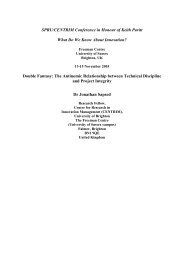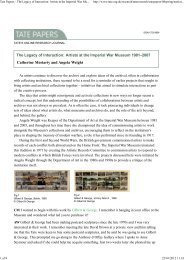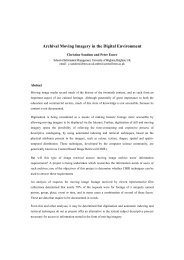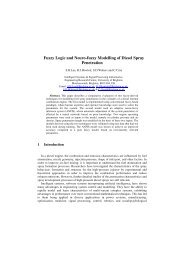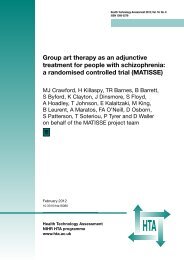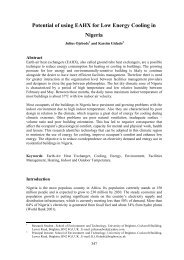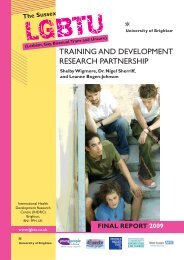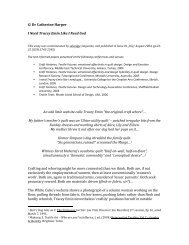NESTA Crime Online - University of Brighton Repository
NESTA Crime Online - University of Brighton Repository
NESTA Crime Online - University of Brighton Repository
You also want an ePaper? Increase the reach of your titles
YUMPU automatically turns print PDFs into web optimized ePapers that Google loves.
outreach needs to be evaluated to ensure that the public is aware <strong>of</strong> their efforts and to<br />
assess their effectiveness.<br />
Another way to improve personal and institutional security would involve further<br />
development <strong>of</strong> systemic or individual privacy enhancing technologies (PETs). These<br />
require investment, foresight into the likely direction <strong>of</strong> criminal activities (via search<br />
techniques, scenario exercises, etc.) and public debate about privacy and data<br />
protection.<br />
However, some cybercrime experts believe that much <strong>of</strong> the technology is in fact secure<br />
and in place and it is mainly human error and insider subversion that accounts for<br />
breaches <strong>of</strong> security.<br />
3.2 Recommendations<br />
There is clearly the need for action at all three levels by the state, the private<br />
sector, the research community and the individual.<br />
As the current recession deepens, cybercrime looks set to make an even greater impact<br />
due to a conjunction <strong>of</strong> factors. First, increasing unemployment could drive more people<br />
into committing cybercrime. The E-crime Survey 2009 reported that fraud committed by<br />
managers, employees and customers in 2008 tripled compared to 2007. 243 It is<br />
reasonable to assume that the recession will exacerbate those problems. Second, the<br />
recession is shrinking the liquidity <strong>of</strong> banks thus limiting their ability to compensate the<br />
financial loses <strong>of</strong> victims. Finally, upcoming dramatic reforms in the police structure may<br />
reduce the size <strong>of</strong> police forces and lead to more cost-effective measures. One <strong>of</strong> our<br />
interviews 244 suggested that there is an urgent need to change the way information is<br />
collected by the police. Effective collection <strong>of</strong> data associated to cybercrimes and sharing<br />
information nationally across police units and internationally – with EUROPOL, and<br />
INTERPOL– is one high-impact measure that could be implemented with relatively little<br />
money, since information is already shared internationally for other internationally<br />
distributed crimes, such as terrorism.<br />
243 KPMG (2009), “E-<strong>Crime</strong> Survey”.<br />
244 Interview with Michael Hallowes, National Policing Improvement Agency (NPIA), 2 nd April 2009.<br />
Page 87





